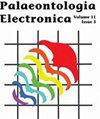A Miocene ant species of the genus Forelius Emery, 1888 (Hymenoptera: Formicidae: Dolichoderinae) from Mexico
IF 1.5
4区 地球科学
Q2 PALEONTOLOGY
引用次数: 0
Abstract
The first fossil ant species of the New World genus Forelius (Formicidae: Dolichoderinae) is described. The type material is a Miocene amber inclusion from the Montecristo mine near Simojovel, Chiapas, southwestern Mexico. The new species is named Forelius chenpauch sp. nov. It differs from its congeners by having a unique combination of characters: antennal scapes reaching the posterior margin of the head; pronotum with six erect hairs; mesonotum with four erect hairs; propodeum with four erect hairs; front and dorsum of head, dorsum of pronotum, dorsum of mesonotum and propodeum covered with a fine striation. Forelius chenpauch sp. nov. has a rounded spiracle, which could be considered a plesiomorphic character closely related to the Forelius group from the north of the Amazon basin. Accordingly, the current divergence estimates of Forelius as a single genus from the Leptomyrmex + Forelius + Dorymyrmex clade (ca. 27 Ma) and the occurrence of Forelius chenpauch sp. nov. in the fossil record (ca. 23 Ma), may suggest that the rounded spiracle is a plesiomorphic state probably widespread since the Miocene from southern Mexico to northern South America.墨西哥新世蚁属一种,1888年(膜翅目:蚁科:蚁科)
描述了新世界蚁属的第一个化石物种。模式材料为来自墨西哥西南部恰帕斯州Simojovel附近Montecristo矿的中新世琥珀包裹体。这个新种被命名为Forelius chenpauch sp. 11 .它与同类的不同之处在于它有一个独特的特征组合:触角状的触角延伸到头部的后缘;前额有六根直立的毛;有四根直立毛的间皮瘤;有四根直立毛的前体;头的正面和背部,前凸背,中凸背和前凸背被细条纹覆盖。Forelius chenpauch sp. 11 .有一个圆形的气孔,可以认为是与亚马逊盆地北部Forelius群密切相关的半纯型特征。因此,目前对Forelius作为Leptomyrmex + Forelius + Dorymyrmex分支(约27 Ma)的一个属的分化估计,以及在化石记录中出现的Forelius chenpauch sp. nov.(约23 Ma),可能表明圆形的螺状体是一种半纯形状态,可能自中新世以来从墨西哥南部到南美洲北部广泛分布。
本文章由计算机程序翻译,如有差异,请以英文原文为准。
求助全文
约1分钟内获得全文
求助全文
来源期刊

Palaeontologia Electronica
PALEONTOLOGY-
CiteScore
3.30
自引率
0.00%
发文量
20
审稿时长
>12 weeks
期刊介绍:
Founded in 1997, Palaeontologia Electronica (PE) is the longest running open-access, peer-reviewed electronic journal and covers all aspects of palaeontology. PE uses an external double-blind peer review system for all manuscripts. Copyright of scientific papers is held by one of the three sponsoring professional societies at the author''s choice. Reviews, commentaries, and other material is placed in the public domain. PE papers comply with regulations for taxonomic nomenclature established in the International Code of Zoological Nomenclature and the International Code of Nomenclature for Algae, Fungi, and Plants.
 求助内容:
求助内容: 应助结果提醒方式:
应助结果提醒方式:


